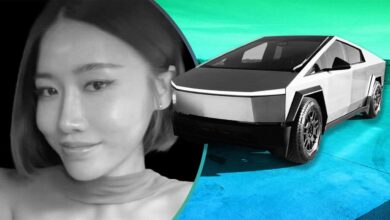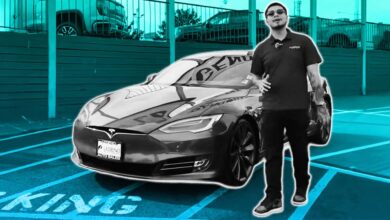Why Hydrogen Cars Aren’t Even Close To As Clean As EVs

- Yet another study found that electric vehicles produce lower CO2 emissions over their liftetimes than gas-powered vehicles.
- It’s a different story for hydrogen fuel-cell EVs, an analysis from the International Council on Clean Transportation found.
- It estimates that hydrogen-powered cars in Europe will have similar emissions to traditional hybrids, due to the way that most hydrogen is produced.
It’s an open-and-shut case at this point: Electric vehicles are cleaner over their lifetimes than combustion cars. Yes, even when you consider that lots of energy still comes from dirty sources. And even when you factor in the extra carbon emissions from making batteries.
Scores of life-cycle emissions analyses have settled that point. But how do hydrogen-powered cars stack up? These are also EVs, just with a different fuel source and a different way of storing it. So they should be pretty clean too, right?
Not exactly, according to a recent study from the International Council on Clean Transportation. The nonprofit research organization projected out the greenhouse gas emissions of vehicles sold in the European Union across several powertrains, taking into account the environmental impact of making, using, repairing and disposing of a car over an average 20-year lifespan.

The ICCT analyzed cradle-to-grave emissions of several vehicle types sold in the European Union in 2025.
Photo by: ICCT
The ICCT concluded that a hydrogen fuel-cell vehicle sold in 2025 will emit 175 grams of CO2 per kilometer traveled, which is 26% lower than gas or diesel cars. Based on Europe’s electricity grid and how it’s expected to change over time, battery-powered EVs should emit just 63 grams of CO2 per km, or 73% less than combustion vehicles.
Fuel-cell cars, according to the study, actually have comparable emissions to hybrids and plug-in hybrids.
Why Hydrogen Fuel-Cell Cars Aren’t That Clean
So, what gives? Fuel-cell electric vehicles (FCEVs), like the Toyota Mirai, Hyundai Nexo and Honda CR-V FCEV, share a lot with battery-electric vehicles, or BEVs. They’re propelled by electric motors, not combustion engines. They don’t belch harmful fumes during operation, just water.
Manufacturing the hydrogen tank does contribute to an FCEV’s lifetime emissions, though not as much as making an EV’s battery, the ICCT found. The real culprit is the way that hydrogen is produced. Today, it’s a dirty process.
“This highlights that FCEVs only provide an emissions benefit comparable to BEVs when using solely renewable electricity-based hydrogen, which is currently not produced and available at scale in Europe,” the ICCT said. “In contrast, BEVs show high emissions reduction potential already when driving on the average grid mix.”
Nearly all commercially produced hydrogen comes from natural gas and is created via a process called steam reforming. In that process, methane reacts with high-temperature steam to produce hydrogen, and CO2 as a byproduct.

The Toyota Mirai is one of the few hydrogen-powered cars for sale in the U.S.
Photo by: Toyota
To be sure, there is also something called “green hydrogen,” which is made by splitting water into hydrogen and oxygen using renewable electricity. Plug that into the equation instead, and the estimated lifetime emissions of a hydrogen car plummets like a rock. According to the ICCT, FCEVs running on renewable hydrogen would only emit 50 grams of CO2 per km—less than a battery-powered vehicle. That is also less than a hypothetical EV in Europe that only ran on renewable electricity sources, the ICCT found.
So hydrogen-powered cars do have the potential to put a real dent in the world’s transportation-related emissions. The problem is that this cleaner kind of hydrogen is barely being produced today.
The ICCT notes that in 2023, 90% of the hydrogen produced globally came from natural gas. Under 0.4% was produced via electrolysis. Things aren’t any better in the U.S. According to the Department of Energy, 95% of the hydrogen produced in the U.S. is made via natural gas reforming.
It’s Not Just A Hydrogen Problem
Of course, where the “fuel” comes from matters for electric cars too. It helps EVs’ case that in the EU, a large majority of electricity already comes from sources like nuclear, solar, wind and hydropower.
A study of EV emissions across the U.S. from the Union of Concerned Scientists illustrates this concept in a really straightforward way—by putting EV emissions into terms anybody can understand.
The UCS determined that driving the average EV in upstate New York, where most power comes from nuclear and hydropower, would produce comparable carbon emissions to a combustion vehicle that gets an astronomical 354 mpg. In most of Texas, where over half of electricity is generated by burning coal or natural gas, owning an EV is more like owning an 83-mpg vehicle.

A lack of fueling infrastructure has been a persistent pain point for hydrogen car adoption.
Crucially, the study found that 97% of the U.S. population lives in an area where driving the average EV produces lower emissions than a 57-mpg car, the most fuel-efficient combustion vehicle you can buy.
So this isn’t just a hydrogen problem. The big, big difference is that EVs are cleaner than gas vehicles today—even when they’re plugged into a grid that often includes fossil fuel-based electricity sources. And they’ll get friendlier to the environment over time too, as solar, wind and other zero-carbon energy sources gain share.
But don’t count hydrogen fuel-cell cars out. Some benefits include faster refueling stops. That could make the technology a particularly good solution for low-emission long-haul trucking, for example.
Despite the whole emissions issue, sluggish vehicle sales and the chronic shortage of refueling infrastructure—in the U.S., only a handful of stations exist, and only in California—several car companies are still betting big that hydrogen fuel cells will take off. Count Honda, Hyundai, BMW and Toyota in that camp.
Contact the author: Tim.Levin@InsideEVs.com
Source link



